Anneleen Boehme – an interview with the Belgian double bass player
We met each other during the Jazzahead and Anneleen was willing to talk with me after her performance with LABtrio. I had seen the band performing as well at the Belgian Jazz Meeting at Brugge in October 2015.
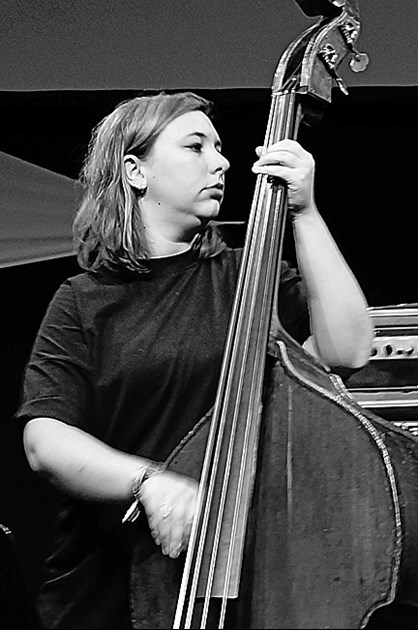
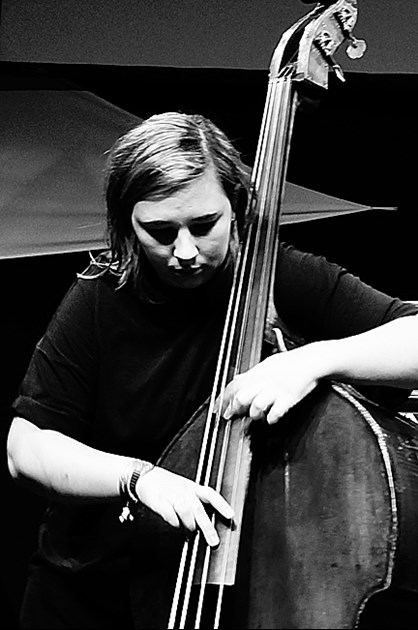
How important was your upbringing considering your career as a musician? What was the first contact with music like?
AB: I think the first contact with music was already in the womb. My parents are musicians, classical musicians. I was brought up with classical music, not Jazz not Pop music either. I did'nt know the songs the kids in school knew like the Spice Girls or whatever it was. I didn't know it but classical music. My parents were always either teaching or away and performing on stage. I grew up backstage at the place where they went for a concert performance. That is my story.
I think it is good and bad. I am fortunate because I have absolute hearing. I know a lot of music. I feel a lot music. When I grew older I had to choose if I wanted to be musician. That's hard. You know when you grow up in a musical family like I did – even though they never pushed me – you feel you have to do it as well. Everybody expects you to do it too. I really struggled to find out if music is what I really want to do. I started studying music and quit after three years. I did not want to do it any more. I studied languages instead. After the language studies some of my friends helped me to see that music is just what I want to do. Then I studied for my master degree. Now I am a musician and I am a hundred per cent sure that this is what I want. It took me a while I have to admit. I didn't want anybody else to decide it for me.
I assume that when you grew up you never thought of playing a double bass. When did you get the idea that the double bass is just the instrument you want to play? Why is it your favourite instrument? Considering your young age I suppose the double bass is not really sexy.
AB: I picked it actually by accident. I used to play the violin and piano as a kid. My aunt used to have a double bass sitting in the corner of the living room. I always tried to play it but was too small. One day I was big enough. The double bass was in our attic. I took it and thought it's really cool. It's cooler than violin! It's cooler than piano. It suits me. I feel good when I touch it. I feel good when I play it.
My father conducts an orchestra. He told me: “Let me get you the scores for the bass player of my orchestra.” He gave it to me and I tried it. After a while I had the idea to go to a music school and try out the double bass. I started to develop my skills. At that time I played violin and piano and double bass. When I was 16 I decided to quit to play violin and to go solely for the double bass. I think it fits my personality. If you are a true musician you pick the instrument which matches your personality the most. I am a bass player and not the most loud person, not the most extroverted person. I am solid. I am the base of everything. I really think it fits for the person that I am, more than any other instrument. It has the most beautiful sound I think.
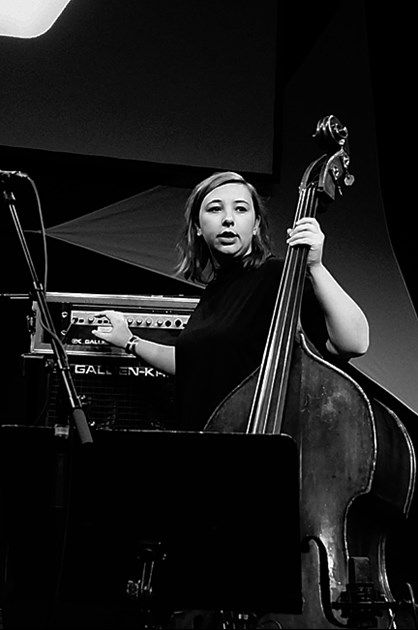
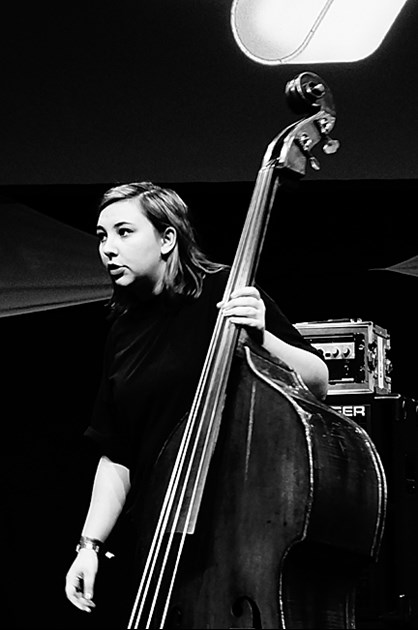
Do you prefer the double bass instead of an E-bass?
AB: I recently bought an electric bass. I am interested in it and I wanna learn it. I realised that it is completely different. It is called a bass but the two basses are totally different instruments. They represent completely different worlds. It happened that I picked the double bass but if there had been an electric bass sitting in the corner of my aunt's place maybe I had picked it up as well. I am interested in learning the electric bass. I can't say I can play it, maybe a little bit. I don't know how to make a nice sound and to work with it properly. I want to take lessons but it is not my first choice.
The double bass seems to me like a furniture of the late 19th century. It is very solid, strong, has an amazing size and volume. To play it you need a bit of physical power.
AB: It does need physical power for sure.
Do you play very physically in comparison with the violin or any other string instrument?
AB: Hm, I would say that a violin or a guitar or any smaller instrument requires smaller muscles and a more sensitive handling. Now I feel I have enough muscles in my fingers and my hands got very strong. If I take up to play a violin today I am way too harsh with it and can't play it any more. I discovered I push it too hard. I hold it too firmly. I guess I developed in another way and my muscles got used to play the double bass. I think physically you are attached to the instrument you play. Mine is strong and big.
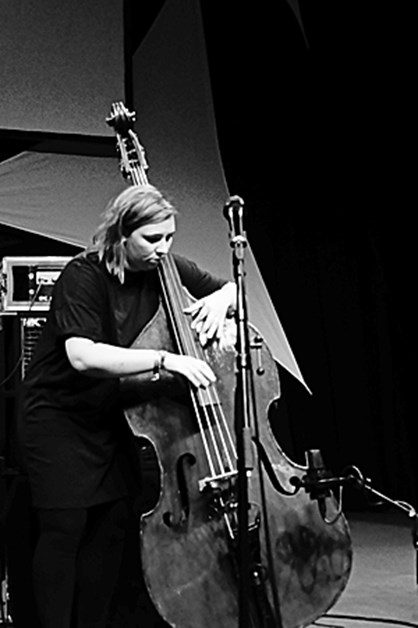
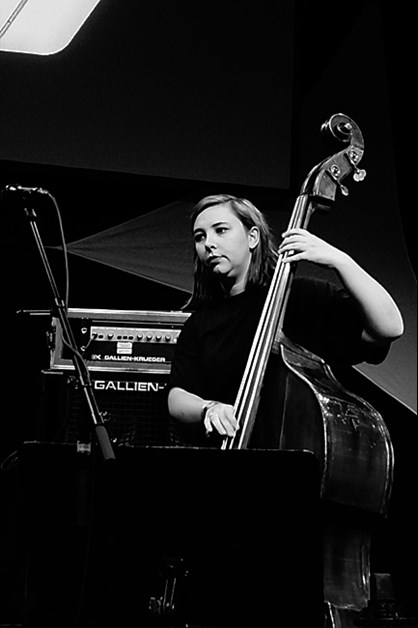
Do you play more melodically or rhythmically or harmonically?
AB: I play more melodically. I took lessons organised by Hein van de Geyn a well known Dutch bass player. He plays very melodically and he was my first teacher. I went to The Hague to study there with him. So he was my first influence and still is. I think apart from the fact that the instrument is so huge and big and not elegant I try to find the elegance in it. You know what I mean? I make melodic lines because that’s what I want to play, and I want to show people that you can play that on a double bass as well. It’s not solely for bass notes.
Do you think you are an exotic person in the world of Jazz considering that women in Jazz are mostly singers and to a lesser degree playing an instrument on stage?
AB: I guess yes. I've been thinking about it and want to know why women only take up singing or female like instruments as the piano. I don't know why. It is a bit strange because quite often people ask me that and say that there are not many women in Jazz. Why does that happen? I wish I would know why and could explain it. Walking around at the Jazzahead and looking around I was thinking: “That is such a men's world.” Maybe there are five per cent women here, maybe even less. Why? I tell you a weird story about LABtrio: People recognize Lander and Bram but people don't recognize me!
But you are the focal point on stage!
AB: I know! We've been together for approx ten years. It is still like that. Why? Because people don't expect what I am doing, because I am a woman? I don't know. I think it is a very interesting question. I am actually looking for an answer. I can say that I am not a girly girl. I don't care much for what is considered to be girly stuff. But I don’t want to be seen as ‘something rare’. As a musician and a person, I am equal to my male colleagues.
I interviewed a German female bass player recently and she told me that women taking up studies at a conservatory they go for the vocal classes instead to learn how to play a trumpet or a double bass. Double bass requires as Ulla Oster admitted a hard training to get the right rhythm and the timing. What is your view?
AB: I don't think it is because we are women that we can not do the rhythmical stuff. Do you know that we as women take it as a compliment if somebody says you play great, you play like a guy. In the beginning I reacted with a Yes but now I say: “Wait a minute. That is not a compliment at all.” Because I play strong and in time I play like a guy? That is nonsense. It doesn't make any sense.
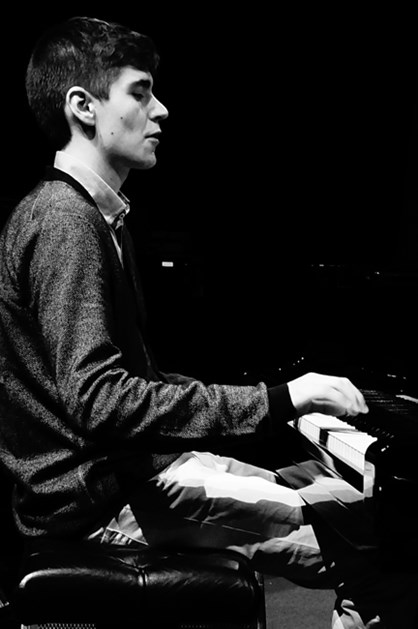
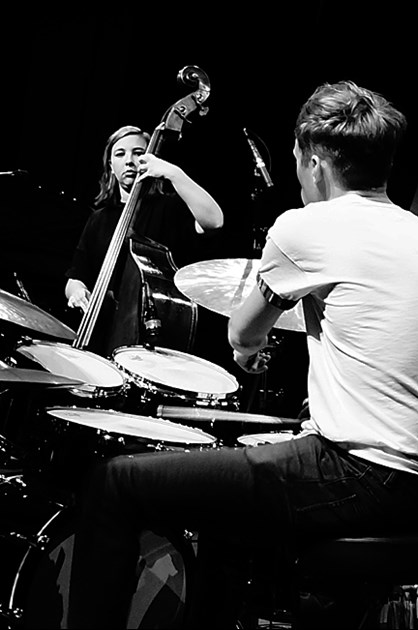
By the way I know that the name of the band is the addition of the first letters of your Christian names but as well the abbreviation of laboratory. Are you still in the stage of planning experiments considering that the name of the band means laboratory? Is it like staying in a kitchen of a chemist and adding substance A to D to see what will happen?
AB: That is completely the way we work. There is never one direction and had not been in the past. We are three completely different people with different backgrounds. We bring this together. There is always happening something there or there. We try to mix the three different ingredients as in a lab to create one new thing out of it. Earlier today someone ask me what the style of LABtrio is like. There is no style. It is a mix of everything we know, everything we like. There is not only one line. Different things are going on, sometimes covering some stuff, sometimes new songs written out or very open. It just depends. It is very variable.
Today you played a chamber music like tune. You played the music of silence, not loud, squeezing or howling. How do you develop that kind of approach to music? By accident? By trying it out?
AB: We never thought to try this style or that style. In the beginning of the band we tried out existing Jazz standards and we discovered how we feel. Chamber music – we often get this remark. We play such kind of music a lot in living rooms for example but as well in big concert halls. People find it very attractive because you do not have to be loud to be good or to be even heard. We always try to get back to the minimum and to make the hall quiet. We don't think about it beforehand. It just happens.
Let's talk about your latest record. You didn't name it “Howling with the wolves” but “The Howls are not what they seem”. Howl is the sound of wolves and the sound of protesting but you show on the front cover a stuffed owl and on the back a stuffed falcon. That puzzled me a bit. What did you have in mind when selecting the album title?
AB: We had a lot of titles in mind. It is almost the quote from the Twin Peaks serial – we played the soundtrack during the our showcase. This soundtrack is a hit of the band and we like it a lot. We wanted to use it but not directly. Therefore we put the H in front of it. Howls is as well a reflection of our music. It has as well to do with the Jazz world, a little bit. How can I explain it? If we play a solo or a cry out in the solo it is not always what it seems. We are trying to howl towards the Jazz scene: We are here; hear us!
Why did you extent the trio and add Chris Hoffman (cello) and Michael Attias (sax)? Was it too boring to play for years with a classical Jazz trio?
AB: It did not get boring. We were a bit stuck. Okay, after all this years, seven years, we thought we are doing it a long time and we need a new vibe. Therefore we decided to make a project with two guest. Bram and Lander studied for a year in New York at the New School. They met Chris and Michael. When they came back we stuck with the music, we stuck with the trio and we knew then we need a new influence. So Lander and Bram said we know these two guys why not invite them. That's what we did. We created a new album and brought us back together. They were gone for a year. We hardly saw each other. They came back full with new ideas and visions. We felt we are miles apart and we could not find each other. By sitting down to create a new album with Chris and Michael together we came together again. Now the project is done and we are a trio again.
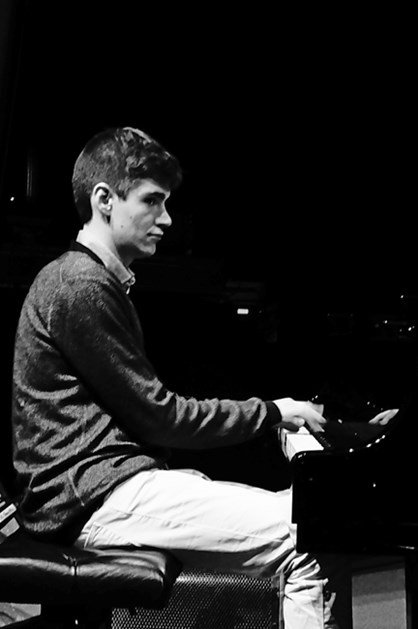
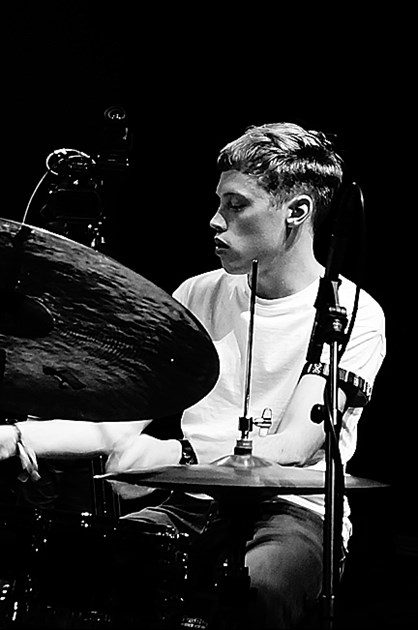
Do you compose together or separately? Or is one of you bringing a composition with and offering it?
AB: It used to be like this. One of us had the composition ready and we tried it out. We could say: “Let's make some changes here and there.” For the last album we decided to create new music - we three all together. We worked together intensively for about two weeks to compose this music. We were sitting in a small room and composed from 10 in the morning until 11 at night. We only had a Rhodes, no drums, no bass, nothing else and checked things out on the computer. We were together all the time and it worked. I never thought it would work. One person played a note on the Rhodes and the others said: “Oh, maybe we are doing this. Oh cool, let's write it down.” We did it for the entire album and we are planning to do the next album in the same way.
Let's talk about two tunes first “Treppenwitz”.
AB: It used to be “trappen” like “stairs” because it had a sort of step-by-step-melody. We changed it to “Treppenwitz” and Bram looked it up what it means but I have forgotten it.
Why is the composition a “Treppenwitz”? Afterwit or staircase wit means to me a great idea which came up too late or a cheap joke? What is your interpretation?
AB: I think the melody is like mocking around.
Let's talk about “Umeå” then, an European cultural city in the far north of Sweden most travellers to Sweden don't know. Why did you select this city as a song title.
AB. We played there when it was nominated as the Cultural Capital of Europe in the 12 Points Festival which is an Irish showcase festival. When we came there we thought what a strange place. It was not very special, still there is such an intriguing vibe. Is this the Cultural Capital of Europe? It's small and not much is happening. There was still snow there. It felt a lot like Twin Peaks. Umeå Jazz Festival asked us back and we went again. Then we thought we have to compose something for Umeå. We were thinking about the city when we wrote the song. We have been there twice and it stuck with us, you know. There are strange vibes and nothing special. Nevermind, we like to go back there actually.
My final question: Why did you create a double bass 4tet with Nathan Wouters , Janos Bruneel, Soet Kempeneer and yourself? What is the challenge to play without piano or sax and drums?
AB: Actually I heard people saying: “Oh that is a good bass player and that one too.” I thought it is a shame that I never get the opportunity to play with them because I am a bass player myself. Why not? I can invite them and play together with them. I was thinking about the Super Bass Trio that once existed. I used to go to weekend camps with double bass players. There were 100 people playing double bass and in the end we played together. It was so nice. I wanted to do this again. I started my quartet because there can not be enough bass. I think the bass is such a nice instrument and it is even nicer when there are more of them. We play my own compositions and some covered songs I really like but I write the arrangement for them. I arranged e. g. a Burt Bacharach tune. I still discover what to do with the quartet. So far it is nice to play together.
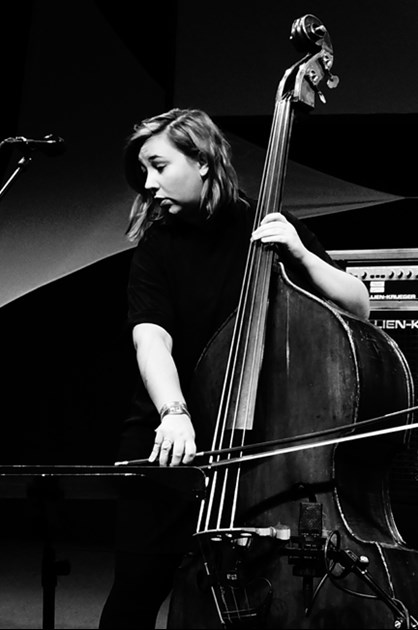
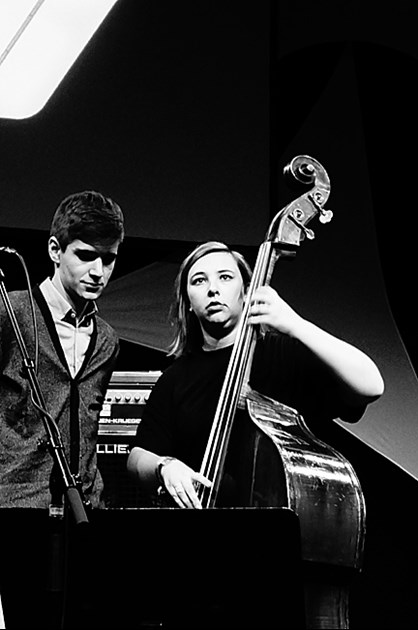
It was a pleasure to talk with you.
Interview and photos: ferdinand dupuis-panther
Informations
Anneleen Boehme
https://www.facebook.com/Anneleen-Boehme-Double-Bass-882384411849863/
https://anneleenboehme.com/over/
https://anneleenboehme.com/media/
http://cobra.canvas.be/cm/cobra/videozone/rubriek/muziek-videozone/1.2413902
Other
In case you LIKE us, please click here:

Foto © Leentje Arnouts
"WAGON JAZZ"
cycle d’interviews réalisées
par Georges Tonla Briquet

our partners:


Silvère Mansis
(10.9.1944 - 22.4.2018)
foto © Dirck Brysse

Rik Bevernage
(19.4.1954 - 6.3.2018)
foto © Stefe Jiroflée
Philippe Schoonbrood
(24.5.1957-30.5.2020)
foto © Dominique Houcmant
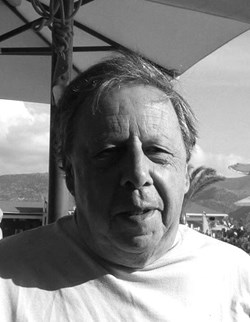
Claude Loxhay
(18/02/1947 – 02/11/2023)
foto © Marie Gilon
Special thanks to our photographers:
Petra Beckers
Ron Beenen
Annie Boedt
Klaas Boelen
Henning Bolte
Serge Braem
Cedric Craps
Christian Deblanc
Philippe De Cleen
Paul De Cloedt
Cindy De Kuyper
Koen Deleu
Ferdinand Dupuis-Panther
Anne Fishburn
Federico Garcia
Robert Hansenne
Serge Heimlich
Dominique Houcmant
Stefe Jiroflée
Herman Klaassen
Philippe Klein
Jos L. Knaepen
Tom Leentjes
Hugo Lefèvre
Jacky Lepage
Olivier Lestoquoit
Eric Malfait
Simas Martinonis
Nina Contini Melis
Anne Panther
Jean-Jacques Pussiau
Arnold Reyngoudt
Jean Schoubs
Willy Schuyten
Frank Tafuri
Jean-Pierre Tillaert
Tom Vanbesien
Jef Vandebroek
Geert Vandepoele
Guy Van de Poel
Cees van de Ven
Donata van de Ven
Harry van Kesteren
Geert Vanoverschelde
Roger Vantilt
Patrick Van Vlerken
Marie-Anne Ver Eecke
Karine Vergauwen
Frank Verlinden
Jan Vernieuwe
Anders Vranken
Didier Wagner
and to our writers:
Mischa Andriessen
Robin Arends
Marleen Arnouts
Werner Barth
José Bedeur
Henning Bolte
Erik Carrette
Danny De Bock
Denis Desassis
Pierre Dulieu
Ferdinand Dupuis-Panther
Federico Garcia
Paul Godderis
Stephen Godsall
Jean-Pierre Goffin
Claudy Jalet
Bernard Lefèvre
Mathilde Löffler
Claude Loxhay
Ieva Pakalniškytė
Anne Panther
Etienne Payen
Jacques Prouvost
Yves « JB » Tassin
Herman te Loo
Eric Therer
Georges Tonla Briquet
Henri Vandenberghe
Iwein Van Malderen
Jan Van Stichel
Olivier Verhelst



